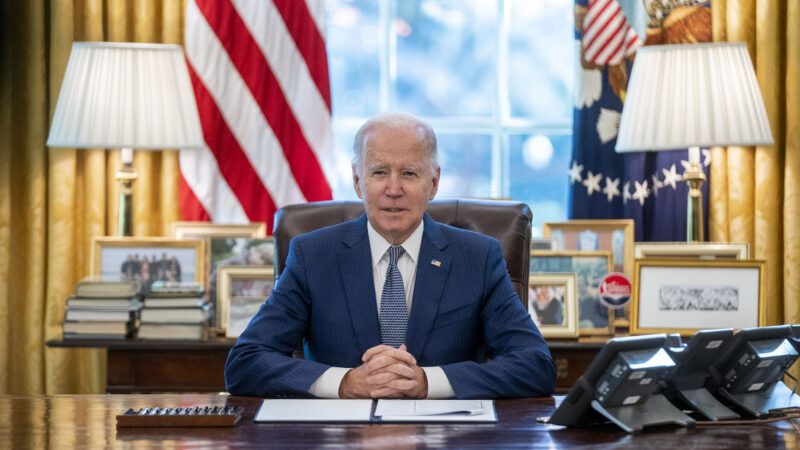Would an Independent Commission Solve the Clemency Backlog?
A new bill would transfer the review of petitions from the Justice Department to a presidentially appointed board.

When Jimmy Carter became president in 1977, fewer than 500 clemency petitions were pending at the Justice Department's Office of the Pardon Attorney. When Joe Biden became president in January, he faced more than 15,000 petitions, a number that had risen to more than 18,000 as of December 14.
A bill that Rep. Ayanna Pressley (D‒Mass.) unveiled last Friday seeks to address this alarming backlog, which includes many people serving unconscionably long sentences for nonviolent crimes, by eliminating the Office of the Pardon Attorney and assigning its functions to an independent, nine-member U.S. Clemency Board appointed by the president. While Pressley is rightly concerned that meritorious cases are languishing at the Justice Department, it's not clear that her FIX Clemency Act would work as advertised.
During the Carter administration, most clemency petitions sought pardons, which clear people's records after they have completed their sentences, relieving them of ancillary penalties such as the loss of Second Amendment rights and ineligibility for professional licenses. Today the vast majority of petitions are for commutations, which shorten the sentences of current prisoners.
The surge in commutation petitions followed an explosion in the federal prison population, which rose ninefold between 1980 and 2013, from fewer than 25,000 to more than 219,000. Since then, the total has fallen by 29 percent, but it is still more than six times the number in 1980.
Sentences also have increased dramatically. Current federal prisoners, 46 percent of whom are serving time for drug offenses, received an average sentence of 147 months, nearly three times the average sentence imposed in 1986.
President Biden, who as a senator played a leading role in crafting and passing the laws that imposed increasingly draconian penalties on drug offenders, now says he has seen the error of his ways. During his campaign, he promised that he would "broadly use his clemency power for certain non-violent and drug crimes."
So far Biden has not granted any pardons or commutations. But when he gets around to it, recent history suggests the Office of the Pardon Attorney will be ill-equipped to help him.
President Barack Obama granted a record 1,715 commutations, nearly all in his second term and the vast majority during his last year in office. But as Margaret Colgate Love, who served as the U.S. pardon attorney from 1990 to 1997, notes, the Justice Department "farm[ed] out responsibility for managing this initiative to private organizations rather than try to identify eligible cases through its own established channels."
Pressley and her allies argue that the current system entails an unavoidable conflict of interest, since it charges the same department that sends people to federal prison with deciding whether to recommend that the president shorten their sentences. Former prisoners such as Danielle Metz and Alice Marie Johnson—who were serving life sentences for nonviolent cocaine offenses before they were freed by Obama and Donald Trump, respectively—agree with this critique and support Pressley's bill.
But Love, now a lawyer who specializes in representing clemency applicants, does not think abolishing her former office is the answer. She argues that the problem of prosecutorial resistance, which she herself encountered as pardon attorney, can be addressed by "removing responsibility for pardon matters from subordinate officials who are also responsible for prosecution policy and returning it to the office of the attorney general."
Love thinks the restoration of rights, a major function of the pardon system, could better be handled by the courts. But she argues that a "reinvigorated" commutation program within the Justice Department is more likely than Pressley's proposal to have a positive impact on prosecutorial practices and "could be integral to an enlightened criminal justice agenda."
One way or the other, the buck stops with the president, who has plenary power to grant clemency. If Biden is serious about trying to make up for his past as a lock-'em-up legislator, he should get started.
© Copyright 2021 by Creators Syndicate Inc.


Show Comments (30)